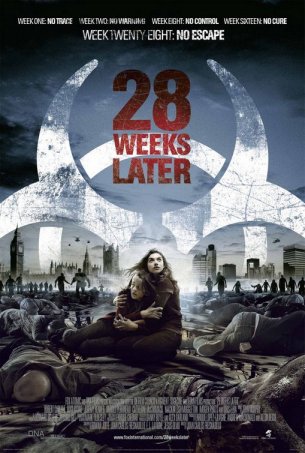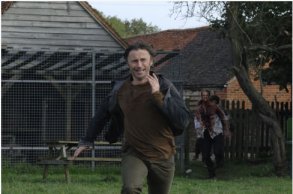|
28
Weeks Later
Though
in hindsight, 28 Days Later
may not have actually "revived" the zombie genre, it did
at least start a good argument with the Dawn
of the Dead remake. Unlike most zombie films, it
also posited a chillingly plausible reason for the apocalypse
- that pesky "Rage" virus.
The problem
facing a sequel is one of the elements that made the first
film so tidy. Like a lot of real-world deadly viruses, if
you can effectively quarantine it, it can't outlive its
host. Though it took four screenwriters (four? Really?)
to work around that point for 28 Weeks Later, it
ends up the most satisfying element of the sequel. The rest
of this film looks like a bunch of college kids got together
and tried to ape the first without paying attention to tiny
details like plot.
Director Juan
Carlos Fresnadillo actually starts somewhere about 28 days
earlier, with a group of survivors hiding in a farmhouse.
Focusing on a middle-class couple, a little bit of exposition
establishes children sent away on a school trip just before
the virus hit, and that these two, played by Robert Carlyle
and Catherine McCormack, are very much in love.
Then the infected
find the farmhouse.
Without giving
anyone much time to think, the movie puts Carlyle in the
position of coward. He scarcely has time to look over his
shoulder to see if his beloved wife gets eaten or not, so
desperate is he to hit the river and escape. But 28 weeks
later…
By
virtue of having survived, perhaps, Carlyle's character
Don is a caretaker of the military complex meant to rebuild
and repopulate London. Convenient, then, that his children
can return when apparently no others are allowed. This is
a momentary plot point brought up by army doctor Scarlet
(Rose Byrne), that Don's son Andy is the youngest person
in London. To which Andy replies that he got his two-toned
eyes from his mom -- as you may guess this is a plot point,
rock fans may be relieved to know that this means David
Bowie will lead us to safety in case of a Rage disaster.
Why wouldn't
the military want children in the city? It soon becomes
obvious because children always, ALWAYS topple the first
domino of stupidity required to make a horror movie plot
work. We could have hoped that they would also trigger a
strong wave of guilt in Don, who lies to them about their
mother's fate. The script, however, just isn't strong enough
to develop that guilt into anything resembling a theme or
a character arc.
Unless you count
that it changes the rules. In the first film, the infected
had two basic states - rest and rage. Both were essentially
mindless, hence the ability for someone to just hide and
wait until they starved. Here, in order to keep this little
more than a twisted family drama, the infected can recognize
dangers (unless it's bullets) and cleverly hide themselves
away. All the better for a red-eyed Don to stalk his children
and show up at inopportune moments.
Maybe 28
Weeks Later wants to demonstrate how monstrous a family's
love can be. Perhaps Don's guilt over abandoning his wife
is so great that he refuses to abandon his children, even
if that means turning them into murderous horrors. Or perhaps,
unlike 28 Days Later, there really isn't some
underlying theme; it's just scary for kids to think their
dad is going to kill them.
Better he should
kill himself, but from the beginning, at least, the screenwriters
establish that Don has a strong survival instinct, and he
will lie and weasel his way out of anything. It's an interesting
trait that is nothing more than a straw man, thrown away
in the pursuit of scaring the audience. 28 Weeks Later
has no point other than to make money, and its set-up of
a third film makes just one more instance of characters
behaving stupidly in order to make the creaky machine of
the plot go.
It
is still scary, in that helpless feeling of never quite
being able to focus on what's going on as people die. Though
Fresnadillo still uses the handheld DV camera, this movie
has lost that voyeuristic feel of the first. It's just by
the numbers. Rating:

|








